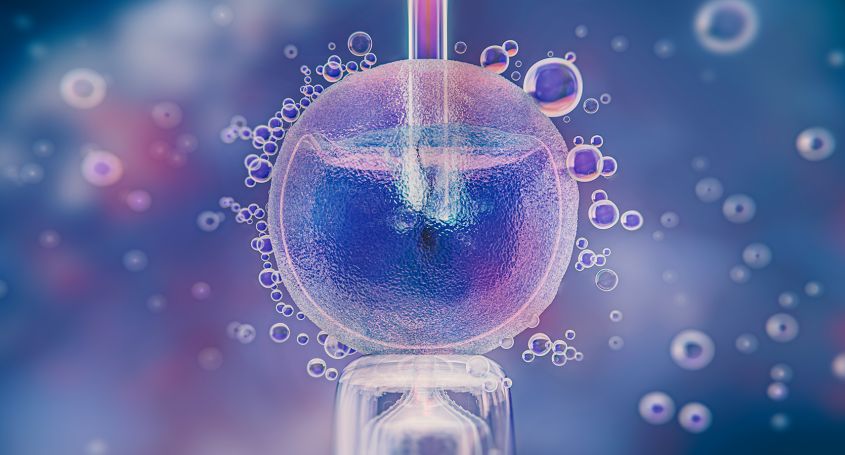Advances in molecular biology and genetics have shown that people's physical and biological characteristics are not only determined by genetic information, but also depend on how this information is expressed. Genes can be activated or silenced by epigenetic regulatory mechanisms that can be modulated by the environment and are particularly relevant during embryonic development.
In the context of fertility, epigenetics plays a fundamental role, given that the lifestyle of both the mother and father can modify epigenetic mechanisms. Factors such as diet, exercise, stress and exposure to toxins can influence gamete quality, embryo implantation and viability, embryo development and even predisposition to disease.
What are the main mechanisms of epigenetics?
Gene expression is modulated by epigenetic mechanisms, including DNA methylation, histone modification and non-coding RNAs, which regulate how, when and how intensely genes are expressed:
- DNA methylation is the mechanism that most influences how genes are expressed. It is a chemical process that involves the addition of methyl groups to certain regions of DNA, which usually results in the inactivation of a gene that would normally be expressed.
- Histones are proteins involved in packaging DNA to form chromatin fibres. Histone modification consists of chemical changes that alter the structure of chromatin, activating or silencing entire regions of chromosomes.
- Non-coding RNAs, such as microRNAs, do not generate proteins but interact with chromatin or interfere with messenger RNA translation, altering gene expression regulation.
These mechanisms are involved from gametogenesis and fertilisation to embryonic development and can be modulated by external factors such as diet and lifestyle.
Lifestyle and epigenetics
Several studies have shown that environmental factors and the mother's lifestyle, both before and during pregnancy, can influence embryonic development and the health of the child even into adulthood.
Diet
A proper diet provides the cofactors and methyl donors necessary to maintain DNA methylation patterns. Certain nutrients such as folic acid, vitamin B12, phenols, zinc and vitamin B6, among others, play a fundamental role in DNA methylation capacity and are necessary for proper embryonic development.
An inadequate diet, as well as maternal obesity or diabetes, can increase the risk of developing metabolic syndromes and cardiovascular diseases, while a healthy diet during pregnancy and breastfeeding can help prevent their onset.
The mother's diet can also influence the levels of omega-3 fatty acids in her milk. Low concentrations of these fatty acids in breast milk can affect the proper neurodevelopment of the child, while high levels promote the development of visual acuity and cognitive functions.
Stress and hormonal regulation
Chronic stress increases the release of cortisol and other stress hormones. At the epigenetic level, cortisol can modify the embryo's gene expression, mainly in genes related to immunity and neurodevelopment.
It has been shown that chronic emotional stress in the mother can leave persistent epigenetic marks on the baby, increasing their susceptibility to developing metabolic disorders, anxiety, stress or depression later in life. Promoting good mental health brings emotional well-being, but it can also help embryonic development.
Physical exercise
Physical exercise has benefits for physical and mental health, but it also has positive effects on fertility and has been shown to alter the baby's epigenetics and development.
Moderate physical activity has been shown to reduce the risk of foetal macrosomia (being born with a weight well above average) and minimise the effects of gestational diabetes, as well as modulating DNA methylation patterns in genes related to metabolism and cardiovascular development. As a result, regular physical exercise during pregnancy can improve the baby's metabolism, reduce the risk of childhood obesity and metabolic diseases, and promote a healthy cardiovascular system and neurological development.
Alcohol, tobacco and toxic substances
Alcohol and tobacco consumption during pregnancy, as well as exposure to toxic substances, has been associated with epigenetic alterations with negative effects on fertility and embryonic development. Nicotine and hydrocarbons present in tobacco induce hypermethylation of key genes in the early stages of embryonic development, while alcohol interferes with methylation, causing epigenetic errors that affect gamete quality.
Similarly, exposure to endocrine disruptors such as bisphenols or phthalates can alter the methylation of genes involved in ovulation and embryo implantation, increasing the risk of infertility.
Avoiding exposure to and consumption of these substances helps protect reproductive health and reduces the risk of long-term diseases.
Healthy lifestyle habits for your child's good health
Adopting a healthy lifestyle not only improves fertility, but can also induce favourable epigenetic changes for embryonic development and reduce the risk of diseases in adulthood.
Taking care of your diet, emotional well-being and avoiding toxins is an early investment in your child's future health.





















